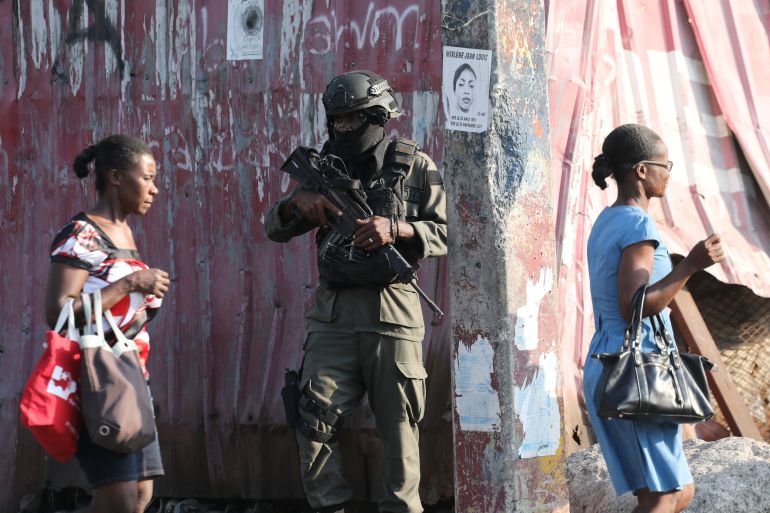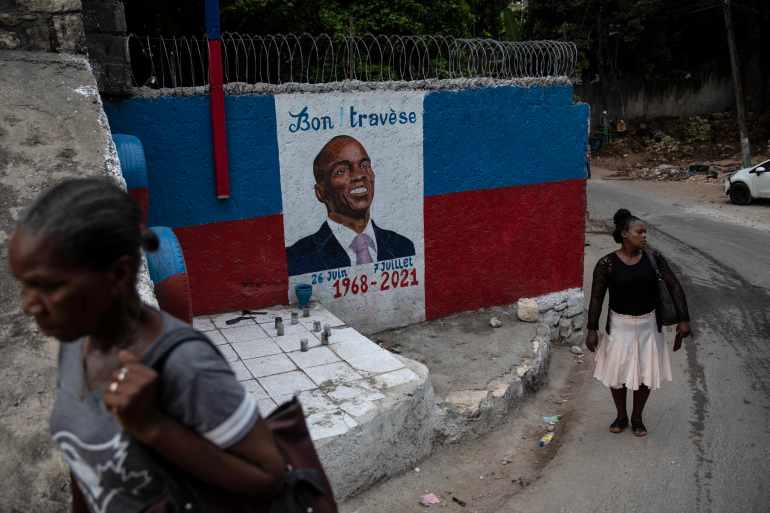‘Criminal and barbaric’: Two Haitian journalists killed by gang
Wilguens Louissaint and Amady John Wesley were killed by gang members on the outskirts of Port-au-Prince on Thursday.

Journalists and press freedom advocates have strongly condemned the killing of two Haitian journalists by a gang on the outskirts of the capital, Port-au-Prince, as the Caribbean nation continues to reel amid a surge in violence.
Wilguens Louissaint and Amady John Wesley were killed in a shooting on Thursday, Radio Ecoute FM told the AFP news agency. A third journalist, who was with them at the time, escaped.
Keep reading
list of 3 itemsHaiti PM flees under gunfire as violence continues to grip nation
Haiti: A Perfect Storm
In a statement posted late on Thursday on the radio station’s Facebook page, Director General Francky Attis said Wesley was beaten and burned alive by “armed bandits” in the Boule 12 neighbourhood as he was reporting on the security situation in the area.
“We condemn in the strongest terms this criminal and barbaric act, which constitutes a serious attack on the rights to life in general, and to those of journalists in particular to exercise their profession freely in the country,” Attis said.
Haiti has experienced mounting gang violence in the aftermath of the July assassination of President Jovenel Moise, with armed groups taking control of entire neighbourhoods and major roads in and around the capital.
Laboule 12, where the three journalists were reporting on Thursday, is the subject of intense fighting between several armed gangs attempting to secure its control.
A route through the area is the only alternative to reach the southern half of the country apart from the main road, which has been controlled since June by one of Haiti’s most powerful gangs.
The country has also seen an increase in kidnappings for ransom during the past year, with Haiti recording at least 950 kidnappings in 2021, according to the Center for Analysis and Research in Human Rights, based in Port-au-Prince.
Haitian Prime Minister Ariel Henry has promised to crack down on the gangs, saying in October that “no real solution to the country’s problems will emerge if we do not arm ourselves with the courage to fight and eliminate this scourge”.
But the violence has continued, with Henry forced to flee under gunfire in the northern city of Gonaives last weekend.

Calls for justice
The gangs’ impunity highlights the weaknesses of Haiti’s criminal justice system, in which investigations are rarely successful.
The April 2000 assassination of Haitian journalist Jean Dominique, the island nation’s most famous reporter at the time, remains unsolved.
In June, Haitian journalist Diego Charles was killed alongside opposition activist Antoinette Duclair and 13 other people in Port-au-Prince. The perpetrators of that shooting also have not been identified by law enforcement.
On Friday, Reporters Without Borders (RSF) condemned the killing of the two journalists in Laboule 12 this week and called on the Haitian authorities “to shed light on this attack and bring the perpetrators to justice”.
“Working conditions for the press in Haiti have continued to deteriorate in recent years,” the press freedom group said on Twitter.
That was echoed by Attis, the director general of Radio Ecoute FM, which is based in Montreal, Canada, home to a large Haitian community.
“In the face of a growing climate of insecurity, criminality and impunity,” he wrote in Thursday’s statement, “we ask the relevant authorities to take their responsibility, in order to create favourable security conditions for all.”